|
|
|
Sort Order |
|
|
|
Items / Page
|
|
|
|
|
|
|
| Srl | Item |
| 1 |
ID:
131415
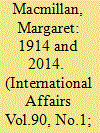

|
|
|
|
|
| Publication |
2014.
|
| Summary/Abstract |
The outbreak of the First World War remains a great historical puzzle and a source of concern, for if we do not understand how it came about we run the risk of stumbling into a similar catastrophe. This article draws parallels between the world of 1914 and the present. It starts with comfortable assumptions made by so many, then and now, that a major conflict was impossible or improbable and then looks at the paradox that globalization not only made the world more interdependent and linked, but also fostered intense local and national identities. It suggests factors that propelled Europe to war in 1914, including national rivalries, imperialism, the arms race and a shifting power balance between rising and declining powers, as well as ideologies and assumptions such as Social Darwinism and militarism, and points out that similar forces and ideas are present today. The article also stresses the dangerous complacency that can arise as a result of decision-makers having successfully dealt with a series of crises. European decision-makers also assumed that they could successfully use war as an instrument of policy and largely ignored or explained away the mounting evidence that the advantage in conflict was swinging to the defence. Again, as the author points out, there are disquieting parallels with the present.
|
|
|
|
|
|
|
|
|
|
|
|
|
|
|
|
| 2 |
ID:
131852
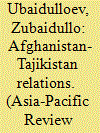

|
|
|
|
|
| Publication |
2014.
|
| Summary/Abstract |
This article attempts to touch upon the relations between Afghanistan and Tajikistan, two neighboring countries, from the historical perspective and the current period. The article analyses the history of Afghanistan-Tajikistan relations during and after the Soviet era, especially during the Afghan Mujahideen's struggle against the Soviet occupational army and Taliban regime in Afghanistan, the Tajikistan civil war of 1992-1997, and after September 11, 2001. In addition, the issues of the ethnic Tajiks in Afghanistan, the violent and vulnerable Tajik-Afghan border, the withdrawal of NATO troops from Afghanistan in 2014 and its impact on Afghanistan-Tajikistan relations, and the new phase of economic relations and an effective cooperation between the both countries are discussed. The article tries to fill the gaps within the body of existing literature and understanding concerning the topic.
|
|
|
|
|
|
|
|
|
|
|
|
|
|
|
|
| 3 |
ID:
130613
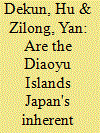

|
|
|
|
|
| Publication |
2014.
|
| Summary/Abstract |
"Historians believe that historical essays have nothing to do with the science of history and are actually harmful. Indeed, authors of such essays, whether intentionally or unintentionally, leave traces of themselves and their time. The same is true of editorials and reviews found in today's newspapers." ' The Origins of the Japan-China Territorial Issue, a new book by Mr. Murata Tadayoshi, an honorary professor at Japan' s Yokohama National University is also an example of what the Contemporary Historian, Mr. Chen Yinke, was referring to in the above. It is common knowledge that after Japan's Noda cabinet adopted its "nationalization" policy over the Diaoyu Islands on September ll, 2012, the Sino-Japan relationship began a downward spiral, while rivalry between non-govemment groups from both nations escalated. The Diaoyu
Islands dispute has become a hot topic for both the media and academia. Among the many works on the topic, Professor Murata's is quite unusual. While tensions remain high between China and Japan, his book carries an impressive argument as shown by work's subtitle-FaZsz?ed Facts in Japanese Government Papers. The cover of the book also features the question--"Are the Diaoyu Islands an inherent part of Japan's territory?"
|
|
|
|
|
|
|
|
|
|
|
|
|
|
|
|
| 4 |
ID:
131424
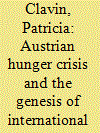

|
|
|
|
|
| Publication |
2014.
|
| Summary/Abstract |
From its foundation in 1918, the new Austrian republic was gripped by famine and a crisis of confidence in its currency that threatened to tip the new state into hyperinflation and revolution. This article shows how western efforts to aid Austria combat famine and its financial crisis were linked, and how they had a profound impact on the new League of Nations, the world's first multi-purpose intergovernmental organization. It also demonstrates the importance of the incipient wartime international bureaucracy for League agency. Contrary to the expectations of its architects, member governments, international financiers, businessmen and economists began to see the League as a useful tool to meet common needs that today would be called the search for human security. The article demonstrates how the Austrian food and financial crisis was the founding moment in the institutionalization of international economic and financial coordination, cooperation and oversight. It established the Economic and Financial Organization of the League of Nations, whose work would later inform its successors, the International Monetary Fund, the World Bank and the European Union. The study speaks to the ways in which the notion of security has broadened in the past two decades to embrace economic, social, political and environmental concerns. But the notion of 'human security' is not new; it was written into the body of the League.
|
|
|
|
|
|
|
|
|
|
|
|
|
|
|
|
| 5 |
ID:
133841
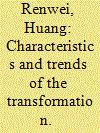

|
|
|
|
|
| Publication |
2014.
|
| Summary/Abstract |
The characteristics of the transformation of the contemporary international system are unprecedented since the birth of the Westphalian system, and even since the end of world war - II and cold war. The transformation of the contemporary international system is reflected firstly in the structural changes to international power, namely the transfer of power. The transfer of power and the transformation of the international order were accomplished through war throughout modern history
|
|
|
|
|
|
|
|
|
|
|
|
|
|
|
|
| 6 |
ID:
132883
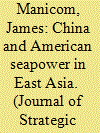

|
|
|
|
|
| Publication |
2014.
|
| Summary/Abstract |
Debates about the future of American seapower in East Asia turn on the argument that American seapower presents a risky and costly luxury that undercuts the cooperative potential of US-China relations. This article asks whether accommodation between China and the United States on the possession and exercise of American seapower in East Asia is possible. Accommodation on this front could significantly lower the risks of unintended escalation and in turn undermine arguments that favour an American retreat from East Asia. The article outlines how accommodation can be achieved on the exercise of American seapower in the region.
|
|
|
|
|
|
|
|
|
|
|
|
|
|
|
|
| 7 |
ID:
133552
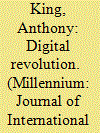

|
|
|
|
|
| Publication |
2014.
|
| Summary/Abstract |
It has been widely acknowledged that military uniforms are significant not only in terms of their practical utility but in terms of their symbolic function. If this is the case, then it is surely noteworthy that in the last ten years there has been a revolution in military uniforms. The disruptive patterns which were the global norm among all military forces in the late twentieth century are in the process of being replaced by new digital patterns. Drawing on the sociology of science and technology, this article explores the development of these uniforms to argue that while neither the scientific research behind digital patterns nor their possible superiority over disruptive designs can be denied, the development of these patterns cannot be seen in purely instrumental or technical terms. Status considerations have been equally important. The paper explores the way in which these new uniforms communicate the new status which professional western forces in the early twenty-first century have been trying to project.
|
|
|
|
|
|
|
|
|
|
|
|
|
|
|
|
| 8 |
ID:
137743
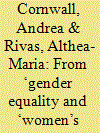

|
|
|
|
|
| Summary/Abstract |
The language of ‘gender equality’ and ‘women’s empowerment’ was mobilised by feminists in the 1980s and 1990s as a way of getting women’s rights onto the international development agenda. Their efforts can be declared a resounding success. The international development industry has fully embraced these terms. From international NGOs to donor governments to multilateral agencies the language of gender equality and women’s empowerment is a pervasive presence and takes pride of place among their major development priorities. And yet, this article argues, the fact that these terms have been eviscerated of conceptual and political bite compromises their use as the primary frame through which to demand rights and justice. Critically examining the trajectories of these terms in development, the article suggests that if the promise of the post-2015 agenda is to deliver on gender justice, new frames are needed, which can connect with and contribute to a broader movement for global justice.
|
|
|
|
|
|
|
|
|
|
|
|
|
|
|
|
| 9 |
ID:
131567
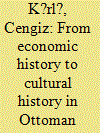

|
|
|
|
|
| Publication |
2014.
|
| Summary/Abstract |
Reflecting on the state of Ottoman social history poses a paradox. On the one hand, it is impossible not to appreciate the great strides accomplished over the past three decades. Earlier approaches have been challenged, topics that were previously untouched or unimagined have been studied, and the foundations of a meaningful dialogue with historiographies of other parts of the world have been established. On the other hand, the theoretical sophistication and methodological debates of Ottoman social history still look pale compared to European and other non-Western historiographies in the same period.
|
|
|
|
|
|
|
|
|
|
|
|
|
|
|
|
| 10 |
ID:
133274
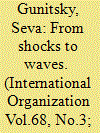

|
|
|
|
|
| Publication |
2014.
|
| Summary/Abstract |
What causes democratic waves? This article puts forward a theory of institutional waves that focuses on the effects of systemic transformations. It argues that abrupt shifts in the distribution of power among leading states create unique and powerful incentives for sweeping domestic reforms. A variety of statistical tests reveals strong support for the idea that shifts in hegemonic power have shaped waves of democracy, fascism, and communism in the twentieth century, independent of domestic factors or horizontal diffusion. These "hegemonic shocks" produce windows of opportunity for external regime imposition, enable rising powers to rapidly expand networks of trade and patronage, and inspire imitators by credibly revealing hidden information about relative regime effectiveness to foreign audiences. I outline these mechanisms of coercion, influence, and emulation that connect shocks to waves, empirically test their relationship, and illustrate the theory with two case studies-the wave of democratic transitions after World War I, and the fascist wave of the late interwar period. In sum, democracy in the twentieth century cannot be fully understood without examining the effects of hegemonic shocks
|
|
|
|
|
|
|
|
|
|
|
|
|
|
|
|
| 11 |
ID:
131574
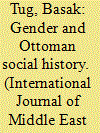

|
|
|
|
|
| Publication |
2014.
|
| Summary/Abstract |
Starting with Said's critique of Orientalism but going well beyond it, poststructuralist and postcolonial critiques of modernity have challenged not only one-dimensional visions of Western modernity-by "multiplying" or "alternating" it with different modernities-but also the binaries between the modern and the traditional/premodern/early modern, thus resulting in novel, more inclusive ways of thinking about past experiences. Yet, while scholars working on the Middle East have successfully struggled against the Orientalist perception of the Middle East as the tradition constructed in opposition to the Western modern, they often have difficulties in deconstructing the tradition within, that is, the premodern past. They have traced the alternative and multiple forms of modernities in Middle Eastern geography within the temporal borders of "modernity." However, going beyond this temporality and constructing new concepts-beyond the notion of tradition-to understand the specificities of past experiences (which are still in relationship with the present) remains underdeveloped in the social history of the Middle East.
|
|
|
|
|
|
|
|
|
|
|
|
|
|
|
|
| 12 |
ID:
131789
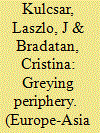

|
|
|
|
|
| Publication |
2014.
|
| Summary/Abstract |
The impact of ageing on community well-being has been part of the policy discourse in the West, but it is a relatively new problem for the post-socialist countries in Eastern Europe. This study focuses on the patterns of ageing in rural Romania and Bulgaria, offering a holistic view of vulnerabilities, including persistent rural disadvantages, ageing in the countryside and the post-socialist transformation. Aggregate Statistics and community case studies reveal the links between demographic processes and community development. This paper contributes to the country-specific analysis of the ageing European periphery in the context of social cohesion as a fundamental European goal.
|
|
|
|
|
|
|
|
|
|
|
|
|
|
|
|
| 13 |
ID:
131418
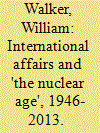

|
|
|
|
|
| Publication |
2014.
|
| Summary/Abstract |
The article reflects on the distinguished record of publication, in around 130 articles over nearly seventy years, on nuclear politics in International Affairs. Although constituting a small drop in the torrent of writings on nuclear matters since 1945, it can fairly be regarded as the most significant contribution to nuclear discourse by any journal outside the United States. The articles published in International Affairs have covered a wide range of issues including nuclear deterrence and strategy, arms control, non-proliferation and disarmament, and the policies-and drivers of policy-of countries, in particular the UK and US. Authors have included P. M. S. Blackett, Wyn Bowen, Alastair Buchan, Hedley Bull, Pierre Hassner, Michael Howard, Rebecca Johnson, Michael MccGwire, Michael Quinlan, Nick Ritchie, John Simpson and David Yost. The discussion concludes with Ian Smart's article of 1975 in which he contemplates the nature of the 'nuclear age' and its persistence or passing, and comments on governments' 'fatuous' attachment of prestige value to nuclear weapons.
|
|
|
|
|
|
|
|
|
|
|
|
|
|
|
|
| 14 |
ID:
131762


|
|
|
|
|
| Publication |
2014.
|
| Summary/Abstract |
This article revisits the security dilemma theory and its application to civil conflict. Based on a careful reading of existing studies, it exposes the deviations from the original theory developed in the 1950s and more recent amendments, which have substantially reduced the explanatory value of the theory. The article shows that when the original and the amended versions of the theory are applied to civil conflict, neither can explain the outbreak of armed conflict. While anarchy might be present as a precondition for the dilemma to operate, a previous history of violent interaction often leaves little room for misperception of intentions. Absent uncertainty about malign intentions toward the other group, the security dilemma theory loses relevance to explain the outbreak of civil conflict.
|
|
|
|
|
|
|
|
|
|
|
|
|
|
|
|
| 15 |
ID:
131448
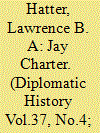

|
|
|
|
|
| Publication |
2013.
|
| Summary/Abstract |
This article reinterprets the Jay treaty by taking seriously the Republican criticism of the treaty's western provisions, which created a porous border between the United States and British-Canada. It argues that Laurentine merchants-entrepreneurs interested in the trade of the extended St. Lawrence River valley-used the Jay treaty as a charter, protecting their commercial and political rights as British subjects residing and trading in the United States. By exploring the conflicts between Laurentine merchants and federal officials over the terms of the Jay charter, this article opens a window on the complex process of state formation in the Anglo-American borderland between 1796 and 1819. It argues that state formation involved a wide array of activities and innovations at both the center and the periphery. More specifically, the article points to the important role that diplomacy, Republican commercial policy, and legal definitions of citizenship played in the creation of an American national state.
|
|
|
|
|
|
|
|
|
|
|
|
|
|
|
|
| 16 |
ID:
133467
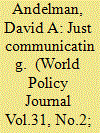

|
|
|
|
|
| Publication |
2014.
|
| Summary/Abstract |
-In March 1975, in what would turn out to be the final month of the war in Cambodia, I thought it might be a nice touch to place a call to my bride of six months and wish her a happy birthday. My interpreter/fixer/photographer, Dith Pranh, advised me to book the call a week or so in advance, which I did at the PTT (Post Telegraph)-the only locale where an international call had even a prayer of going through. At the appointed time, I appeared there and, after a wait of only several hours, the operator announced that my party was on the line in New York, and I could pick up "the apparatus" in Cabin #1. I lifted the phone and there, 7,000 miles away, was a very faint voice of Susan making its way through a cloud of electronic noise, crackles, and pops. We shouted at each other for a minute or so, before we finally gave up on any meaningful communication.
|
|
|
|
|
|
|
|
|
|
|
|
|
|
|
|
| 17 |
ID:
131463
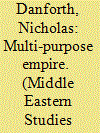

|
|
|
|
|
| Publication |
2014.
|
| Summary/Abstract |
This article examines popular, academic and political perceptions of the Ottoman Empire in Republican Turkey, challenging the widespread assumption that there has been a continuous clash between pro-Ottoman Islamists and secular, anti-Ottoman, Kemalists. It argues that in the Republican period Kemalists effectively appropriated the Ottoman past for use in their nationalist narrative, not only through using a 'theory of fatal decline' but also by simply defining positive cultural or political symbols from the years 1299 to 1923 as 'Turkish' rather than 'Ottoman'. This serves as a backdrop for the article's main argument, that the 1940s and 1950s saw a thorough Kemalist appropriation of the Ottoman past, celebrating the empire's golden age as secular, pro-western and Turkish. The 500th anniversary of the conquest of Istanbul in 1953 gave the Turkish government an opportunity to showcase this new interpretation of Ottoman history as well as to use the relatively new rhetoric of 'Ottoman tolerance' to claim for Turkey a place among its new allies in the democratic, anti-communist West. At the level of domestic politics, the Democratic Party sought to wrap its modernization policies in the mantle of a progressive, democratic Fatih Sultan Mehmet II, while the Republican People's Party condemned the Democrats for betraying Fatih's memory and the nation's honour by downplaying the Ottoman past in order to placate potential anti-communist allies in Greece and the Arab world. Ultimately, the article argues that it is impossible to understand contemporary Islamist and liberal uses of the Ottoman past without understanding the way the empire was incorporated into the dominant Turkish nationalist narrative between 1923 and 1953
|
|
|
|
|
|
|
|
|
|
|
|
|
|
|
|
| 18 |
ID:
131431
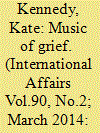

|
|
|
|
|
| Publication |
2014.
|
| Summary/Abstract |
The First World War involved composers just as it involved writers. We rarely hear, however, about the classical music that was written during the war, or after it, while for generations now the war has been remembered through the literature of the war poets and the memoirs of the late 1920s (Vera Brittain's Testament of youth, or Siegfried Sassoon's Memoirs of an infantry officer, for instance). This article aims to put composers alongside their literary counterparts, to present a fuller picture of cultural responses to the conflict. It looks at works by Edward Elgar, Ivor Gurney, Herbert Howells, Patrick Hadley, Gerald Finzi, John Foulds, Frank Bridge and in particular at Arthur Bliss's symphony on war, Morning heroes. It charts the changing responses of music to the war from the first patriotic statements to the requiems of the postwar years. It looks at compositions by civilians, and by composers who served abroad, to examine how classical music is uniquely placed to commemorate, inspire and mourn.
|
|
|
|
|
|
|
|
|
|
|
|
|
|
|
|
| 19 |
ID:
132095
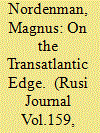

|
|
|
|
|
| Publication |
2014.
|
| Summary/Abstract |
Since the 1990s, Denmark, Norway, Sweden and Finland have worked as NATO members or partners, participating in expeditionary operations and playing political leadership roles in the transatlantic security community. Today, however, the Nordic-Baltic security environment is changing rapidly, a trend only further accelerated by the Ukraine crisis. Magnus Nordenman argues that the emerging strategic environment will force the Nordic nations to focus on challenges closer to home, and that their current defence constructs will be challenged if they are not further refined and if co-operation is not extended
|
|
|
|
|
|
|
|
|
|
|
|
|
|
|
|
| 20 |
ID:
131429
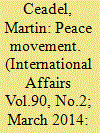

|
|
|
|
|
| Publication |
2014.
|
| Summary/Abstract |
The First World War led to the reconstruction and reinvigoration of the British peace movement, which steadily increased in activity and impact from 1914 until the end of the 1930s. This article defines the movement, explains why it emerged first and developed most influentially in Britain, and outlines the various phases of its history from the 1790s until the present day. It concentrates on the less well known phases of the movement's history: its origins during the French Revolutionary and Napoleonic Wars and on its moments of political significance during the nineteenth century. It says less about the post-1945 movement, which readers of International Affairs will be more familiar with, though it makes the point that 'peace' is currently being trumped as the primary political goal of most progressives by 'human rights', which can be invoked to justify military intervention.
|
|
|
|
|
|
|
|
|
|
|
|
|
|
|
|
|
|
|
|
|